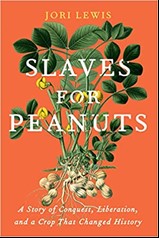
Slaves for Peanuts: A Story of Conquest, Liberation, and a Crop That Changed History
花生的奴隸:征服、解放與作物的歷史變革
內容介紹
★ 一部驚艷眾人的通俗歷史作品——一段關於作物如何改變奴隸歷史的故事。
「路易斯的作品融合了強大的故事敘述和權威的歷史研究,她嫻熟於在全球背景下建構屬於在地的事件。」─the Whiting Award Committee on Slaves for Peanuts
「在此書內容中,你會遇到瘟疫和宮廷陰謀、冒險和不幸、造王者和破壞者、財富的贏家和輸家——所有這些都圍繞著這不得了的花生!在經過充分研究、引人入勝的散文中,約里.路易斯揭示了塞內岡比亞土地上這種主要出口作物、奴役和廢除之間的密切聯繫。戰爭為它而戰,以及圍繞它的歷史。這項工作是對非洲史學的重要貢獻。」——桑德拉·傑克遜-奧波庫(Sandra Jackson-Opoku),《鮮血誕生之河》(The River Where Blood Is Born)的作者和《修訂詩篇》(Revise the Psalm)的共同主編
「在這場穿越大西洋世界的花生旋風之旅中,記者約里·路易斯巧妙地揭示了作物、人類、奴隸制和殖民主義相互交織、令人不安的軌跡。《花生的奴隸》是一部廣泛、複雜、出人意料、被生動講述的環境歷史。」——蒂婭·邁爾斯(Tiya Miles),哈佛大學歷史教授,《她所攜帶的一切》(All That She Carried)作者
美國人每年消費超過十五億磅的花生產品,卻對花生動盪喧嘩的歷史一無所知,這段過去與奴隸、自由有相當大的關係。作者約里.路易斯(Jori Lewis)將花生作為經濟作物,以及其相關的人類與自然歷史靈活地編織在一塊,閱讀起來既抒情又充滿力量。作者揭露了歐洲對於花生油的強烈需求如何鞏固了奴隸制度,直到歐洲勢力離開其所控制的領土許久之後,這股支撐制度的力量才宣告瓦解。
藉由深入考察西非和歐洲的檔案,路易斯重新建立一幅非洲沿岸的圖像,這幅圖像真實到讓人驚嘆。從一位窩藏逃逸奴隸的非裔法國傳教士,到深深影響法國帝國主義政策的沃洛夫語(Wolof)國家領導者——這些故事挑戰了過往對支撐奴役制度之人及其動機的基本假設。
當美國人正和奴隸制歷久不衰的遺緒糾結在一塊時,這本書為我們開啟一段既新穎又具啟發性的世界歷史章節。
作者介紹

約里.路易斯(Jori Lewis)為農業與環境領域的獲獎記者。她的報導曾出現在責任投資原則組織(PRI, Principles for Responsible Investment)的《世界》(The World),也曾刊登於《發現》(Discover Magazine)、《太平洋標準》(Pacific Standard)和《弗吉尼亞季刊》(Virginia Quarterly Review)。她也擔任有關全球政治的文學雜誌《亞迪》(Adi)的特約編輯。2018年,她獲得頗具威望的「懷亭非虛構創作獎金」(Whiting Grant for Creative Nonfiction)。路易斯時常往返於伊利諾州和塞內加爾,《花生的奴隸》(暫譯,原書名為Slaves for Peanuts,The New Press出版)是她的第一本書。
書評
“Slaves for Peanuts is a valuable addition to agricultural and West African history.”
—Nature
“The geopolitical game Lewis describes in Slaves for Peanuts is an old one, and one essential to the formation of the modern world.”
—Africa Is a Country
"Slaves for Peanuts plumbs a fascinating and disturbing slice of history, shining a light on another glaring example of Western hypocrisy and oppression.”
—NPR Books
“[Slaves for Peanuts] unearths the stories of African kingdoms and colonial settlements, showing how demand for peanut oil in Europe drove the expansion of the peanut trade in Senegal in the 19th century and ensured that slavery and indentured labor in West Africa would continue long after the Europeans had abolished it.”
—Civil Eats
“Astute and distressing. . . . This informative and compassionate account unearths a little-known chapter in the history of slavery and European imperialism.”
—Publishers Weekly
“Within these pages, you’ll encounter plagues and palace intrigues, adventures and misadventures, kingmakers and kingbreakers, fortunes won and lost—all wrapped around the mighty peanut! In well-researched, engaging prose, Jori Lewis unravels the intimate connections between this major export crop, enslavement, and abolition on Senegambian soil. The wars fought over it, and the history that surrounds it. This work is an important contribution to African historiography.”
—Sandra Jackson-Opoku, author of The River Where Blood Is Born and co-editor of Revise the Psalm
“In this whirlwind tour with the yellow-blossomed peanut across the Atlantic world, journalist Jori Lewis skillfully unveils the intertwined and troubling trajectory of plants, people, slavery, and colonialism. Slaves for Peanuts is a broad, complex, and unexpected environmental history vibrantly told.”
—Tiya Miles, professor of history, Harvard University, and author of All That She Carried
“Slaves for Peanuts is a revelation. With elegant prose and engaging details, Lewis uncovers a vital history that promises to transform our understanding of slavery and colonialism. Though focused on a single crop, this terrain is vast and deep. I highly recommend this outstanding work.”
—Imani Perry, Hughes-Rogers Professor of African American Studies, Princeton University, and author of Breathe
“Jori Lewis’s superbly readable book does more than bring life to something we all too often ignore: the history of slavery in Africa. She has also found a sort of African version of the Underground Railroad. And all of this is connected to an everyday food whose history we seldom think of.”
—Adam Hochschild, journalist, historian, lecturer, and bestselling author of King Leopold’s Ghost
“Slaves for Peanuts is an extraordinary and often tender work of meticulous research that spans time and continents, an insightful and captivating narrative of how slavery in Africa supported industrialization in the West, and how enslaved people took back their freedom. I am in awe of the authoritative care with which Jori Lewis lays out the entangled relationships between white supremacy, capitalism, food, and the indefatigable human agency. A must-read that illustrated the long-standing history of the many ways in which the African continent has been for centuries paying the price for the comforts of the Global North.”
—Anna Badkhen, author of Fisherman’s Blues
“Jori Lewis has achieved the nearly impossible task of educating us about peanuts, a vegetable juggernaut that has changed the world, while recounting stories of slavery and freedom, all presented with extraordinary nuance and humanity. Slaves for Peanuts is a triumph of deep research and engaging writing.”
—Andrés Reséndez, professor, department of history, University of California, Davis, and author of The Other Slavery
“In this magnificently researched, beautifully told narrative history, Jori Lewis brings the roiling story of slavery and liberation in West Africa to life. By combing through stacks of archived documents on three continents, she masterfully weaves a rich tale of African kingdoms and European ‘civilizers’; of unbathed Englishmen and mystical priestesses; of camel caravans and railroad bandits; of imperial decrees, epic poems, and forests in the mist. At the center of it all stands the towering figure of an African protestant pastor and liberator; and, not far away, the fertile soils that would send the humble, mighty peanut to distant shores, and into history.”
—Sandy Tolan, professor of journalism, USC Annenberg, and bestselling author of The Lemon Tree
